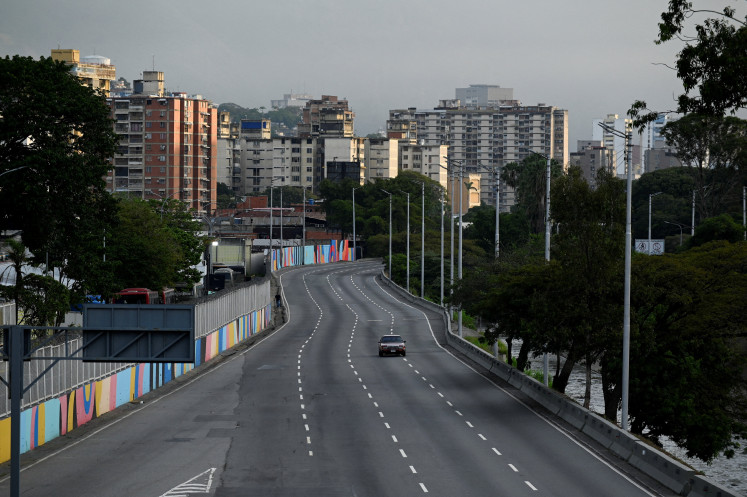Popular Reads
Top Results
Can't find what you're looking for?
View all search resultsPopular Reads
Top Results
Can't find what you're looking for?
View all search resultsFighting ‘neocolonialist’ response to coronavirus
Since the World Health Organization declared COVID-19 a pandemic on Jan
Change text size
Gift Premium Articles
to Anyone
S
ince the World Health Organization declared COVID-19 a pandemic on Jan. 30, the responses of panicked governments have been almost universal: drastic measures on social distancing and general containment of populations.
Italy, in particular, adopted measures of increasing strictness as the tide of death swept through the Lombardy region, where hospitals became overwhelmed. France had a delayed response, with President Emmanuel Macron still dining out in Paris and going to the theater on March 9 to play down the virus’s risks and to reassure the French population, before finally announcing a lockdown one week after.
On May 18, schools reopened in 22 European countries including France, and Germany’s Bundesliga premier soccer league resumed two days earlier, all under strict health protocols.
Indeed, the epidemic is heating up confined minds to come up with all kinds of conspiracy theories about the virus’s origin. For policymakers, however, this issue is secondary: The hottest issue is how to avoid as many deaths as possible in the short term.
The established protocol is test, trace, isolate, treat.
Facing a shortage of testing equipment, many countries went into a panic on catastrophic projections of widespread deaths from the contagion to adopt mass containment, the most extreme measure.
This desperate measure that dates back to the 19th century has had dramatic consequences in India; a measure that is, in the words of French infectious disease specialist Didier Raoult, much less judicious than isolating and treating only those people who presented symptoms of the disease.
However, it is clear that the virus has not killed en masse as researchers predicted in those countries that did not adopt this extremely restrictive measure, such as Sweden, Japan and the Netherlands.
Meanwhile, a scientific paper by authors Jose Lourenco et al posted on March 26 (doi.org/10.1101/2020.03.24.20042291) offers a suggestion in
its very title: “Fundamental principles of epidemic spread highlight the immediate need for large-scale serological surveys to assess the stage of the SARS-CoV-2 epidemic”.
To put things in perspective, you have to return to the facts. As of May 28, COVID-19 has infected over 5.9 million people and killed more than 362,000 people worldwide. However, only six countries stand out in lives lost to the virus: the United States (103,000 deaths), the United Kingdom (37,000), Italy (33,000), France (28,600), Spain (27,000) and Brazil (26,700). It should be noted that Japan, despite having an aging population of 126 million people, has recorded relatively fewer deaths: 867 lives lost to the virus.
The SARS-CoV-2 virus causes a more severe form of the disease in the elderly, but also in people with comorbidities such as obesity and diabetes.
What is so special about this coronavirus that it has caused the world to stop turning in the panic at the beginning of the pandemic, even though we can see now that the death rate has been greatly overestimated? What lessons can be learned from all this in Indonesia, where increasingly heavy measures are announced every week?
According to a study by Qasim Bukhari (papers.ssrn.com/sol3/papers.cfm?abstract_id=3556998) of the Massachusetts Institute of Technology, heat and humidity slowed the spread of the virus between Jan. 20 and March 19.
In addition, the virus most affects people aged 75 and above. In Indonesia, with its youthful population of which only 5.8 percent is aged above 65, the virus’s impact will be incomparable to how it has affected Europe.
Indonesia recorded 1,496 deaths as of May 28. Even if this figure is underestimated, we are very far from a mass slaughter, even though the virus has been spreading progressively in the country for about three months.
Does such a low impact justify shutting down the country completely? Why should our decision-makers imitate the decisions of other countries (Europe, the US) that have very different impacts?
Iran is an interesting example because it has taken a long time to adopt measures, but it has not had an excessively large number of deaths (over 7,600 for a population of 82 million).
Indonesia decided to restrict all passenger transportation to enforce its ban on mudik (exodus) during Ramadan, obviously fearing that the virus might spread among millions of people on the move.
Policymakers certainly cannot settle for the most optimistic assumptions and must prepare for the worst; perhaps.
But they also have an obligation to plan, because “to govern is to plan”, as well as to measure the beneficial effects of their short-term decisions in terms of their medium and long-term consequences.
These are obvious: The brutal cessation of economic activities is unemployment, impoverished families, less nourished children, bankruptcies, sick people who can no longer afford medicine, millions of people in hardships, and others that could result in deaths, too.
Indonesia must take this deleterious impact into account and resist the temptation to imitate western countries under the influence of an intense and hysterical media campaign.
There exists in the Indonesian DNA the spirit of anticolonialism and anti-imperialism that should be revived for the country to take independent solutions that are most suited to its specific case, rather than simply copying and pasting mainstream responses.
It is time to take a serious look at the relative costs, in terms of finance but in human lives above all, of the various austerity measures in the short and medium terms. Paralyzing the economy is not the option for saving lives.
____________
Virology graduate, Pierre and Marie Curie University, Paris










